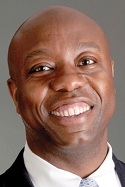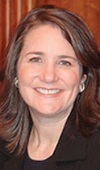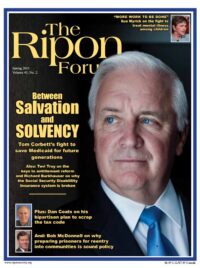
I was a lobbyist. I did it for five years, liked the work and loved the “inside” game.
I also worked in the media, for 15 years, in radio and TV. I had a political beat and it gave me my introduction to government. It was good work for a young man. Both of these professions gave me a front row seat in the sausage-making that is the legislative process.
Now I travel the country as a consultant on legislative affairs. In the course of a year I get to meet hundreds of average, everyday Americans. You know the type: the kind of people that do most of the working, living and dying, and they do it outside the glare of the paparazzi, 24-hour news coverage and the witty banter of talk shows. They are everyone and no one, and they are everywhere. Yet, with numbers in the millions, how is that our Congress seems to know so little about them?
Our Congress is sent to Washington ostensibly as a reflection of the population that elected them. I suppose that is true to a point. But in listening to the rhetoric and what passes as intellectual discourse in our nation’s capital, one could conclude that our representatives don’t understand much of our people beyond the narrow confines of their individual districts and the city in which they all periodically congregate for session – Washington D.C.
In listening to the rhetoric and what passes as intellectual discourse in our nation’s capital, one could conclude that our representatives don’t understand much of our people beyond … Washington D.C.
Throughout the year, dozens of Congressmen and Congresswomen and a coterie of staffers will pack up, dress up and take off on the travel-fest known as a CODEL. Short for COngressional DELegation, these junkets permit lawmakers to leave our country and learn how the other half lives in the four corners of the globe. These are getting-to-know-you trips.
They have alternately been described as boring trips punctuated by endless lectures and power point presentations to bacchanals that only Caligula could appreciate. Want to see how high-speed rail really works? Go to France and take a ride on the 180- mph Tres Grande Vitesse. What about wind projects? Denmark will do nicely.
While not perfect, CODELS do offer some utility in furthering our understanding of foreign lands. It’s one thing to read about a place. It’s another thing all together to be there in person. Some criticize these trips for their cost to the American public, and certainly, priced out through commercial rates, CODELs to some might be a bit pricey.
But I think their value usually overrides their cost.
Getting to Know “Those Guys”
But I write not to end CODELs in the name of fiscal austerity. Instead I am writing a plea to expand them to one more destination. You may have heard of it: The United States of America.
It’s ironic that with the myriad of ways to communicate — from Twitter to Facebook to e-mail to texting, and with three 24-hour news channels and a seemingly endless reservoir of voices weighing in on every issue trivial and important — that our leaders seem to know so little about the country they are trying to lead.
What’s striking is that it’s not their fault. Think about it: each House member represents a district of roughly 650,000 individuals. And every decade those districts are carefully gerrymandered scientifically to silence the cacophony of discord and replace it with the harmony of one note played by one instrument orchestrated by one party for a 10-year concert. And this being the year when all districts are redrawn new, one-note tunes are being composed as I write. The result of this reconfiguring is that it spawns individuals who respond mostly to their political family, who care little for countervailing opinions, and who inject a take-no-prisoners, combat-level of hostility into the debate. No one gets hurt physically. But there’s a lot of collateral damage.
A CODEL to America will afford every Member an opportunity to know that part of the U.S. that comprises their personal fly-over territory. Going to another district that is identical or even similar will do nothing but beef up frequent flyer accounts. No, it has to be alien territory that one visits; city to country, liberal to conservative, Republican to Democrat. In other words, you must get to know “those guys.”
A CODEL to America will afford every Member an opportunity to know that part of the U.S. that comprises their personal fly-over territory.
The guest Member will have to see the host’s district up close and personal. That means touring a district in the backseat of a staffer-driven Suburban is out — at least out as the only thing that is accomplished. Instead, I submit, that both Members host a town hall meeting or two. Take questions from constituents. Do an editorial board meeting with a local paper. Take calls from listeners to a local radio talk show. Have dinner in the host’s home. Maybe even spend the night in the host’s home.
Then, reverse the trip at some later time but within the confines of a Congressional session. It will take two days tops; long enough to get the swing of things, but not too long to be cumbersome for the host.
Santa Monica Meets Sioux Falls
What would a Member gain from this CODEL? Well, for starters they would get a front-row seat in seeing how the other half lives.
Think mass transit is waste of money? Then talk to a worker or professional that has millions of neighbors all vying to get to the same place at the same time.
Think about adding a buck or two to the fuels tax? Talk to a farmer who owns machinery that helps provide food for thousands but sucks gas like an airplane.
Want to take guns away from individuals? Talk to a family that has owned firearms for generations, or a person who has used a gun to defend his or her family from an intruder.
In a sense these CODELs to America would be like a Congressional hearing, except without the formality, and where the setting is part of information gathering process. Ask any man or woman who has run for President about what they learned about this country in the early stages of a campaign. The time spent in living rooms, back yards and diners in Iowa and New Hampshire or South Carolina provides a graduate level course on America and the people who really make it work.
Take any Member — let’s say Representative Mike Pence, a seven-term Republican from the sixth congressional district in Indiana — and have him spend a couple of days in the district of his political opposite — say Representative Gregory Meeks, a six-term Democrat who represents Queens in New York.
Pence — a conservative — hails from a largely white mostly rural agricultural district in the eastern part of the Hoosier state. It has lots of farmers and wide-open spaces. Meeks — a liberal from minority-majority Queens — has a district that is 100 percent urban. It has no wide-open spaces and no farmers. Think either one of these legislators know all that much about the other’s district and their constituents? I am going to go out on a limb and guess their knowledge barely scrapes past anecdotal. Another example could pair Republican freshman South Dakota Representative Kristi Noem and 19-term California powerhouse Democrat Henry Waxman. Santa Monica meets Sioux Falls. How about Diane DeGette, eight-term liberal Democrat from Colorado, pairing off with Republican first-termer Tea Partying Tim Scott from South Carolina? Replicate these domestic CODEL’s to include the entire House of Representatives, and you would get a talent pool on Capitol Hill that just might be more well-rounded on the subject that is most important to all of us – America.
Another example could pair Republican freshman South Dakota Representative Kristi Noem and 19-term California powerhouse Democrat Henry Waxman. Santa Monica meets Sioux Falls. How about Diane DeGette, eight-term liberal Democrat from Colorado, pairing off with Republican first-termer Tea Partying Tim Scott from South Carolina? Replicate these domestic CODEL’s to include the entire House of Representatives, and you would get a talent pool on Capitol Hill that just might be more well-rounded on the subject that is most important to all of us – America.
How about Diane DeGette, eight-term liberal Democrat from Colorado, pairing off with Republican first-termer Tea Partying Tim Scott from South Carolina?
 Who’ll decide who goes where? Let’s try a non-partisan, good-government organization to determine the matchups. The pairings should not be determined by Congress because — well, we all know why.
Who’ll decide who goes where? Let’s try a non-partisan, good-government organization to determine the matchups. The pairings should not be determined by Congress because — well, we all know why.
Individuals change the longer they remain in public office. And I don’t necessarily mean that in the pejorative. It’s just that the demands of public office these days are an all-consuming commitment of time and energy. Couple that with the need to constantly raise money, to meet with constituents and lobbyists, and to tend to party matters, and it’s no wonder that the worlds created for Members of Congress tend be insular echo chambers. If you are doing all of that, all of the time, just how much do you really know about the rest of America?
In listening to the cacophony that emanates from the Capitol, this American has concluded the answer to that question is not much — which is why it might be as good a time as any for Members of Congress to do something out of the ordinary.
Visit the country they are trying to lead.
Jim Murtha is a member of The Ripon Society’s editorial board and Board of Directors. He is also Managing Partner of the National Field Resource Network.




